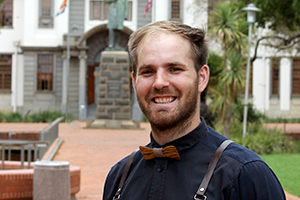
Paul Whitehead, owner and founder of
Major John.
Photo: Supplied
Paul Whitehead never thought the small business he started in his hostel room at the University of the Free State (UFS) in Huis Abraham Fischer on the Bloemfontein Campus would develop into something of magnitude.
Paul, who completed his Honours degree in Architecture in 2015 at the UFS, is currently taking a gap year due to the rapid growth of his business. Major John started back in December 2012, with Love Warrior becoming Paul’s first outlet. In 2014 Paul started manufacturing his first series of timber bow ties and after that, sales started booming.
Supplier to 16 outlets in South Africa
“We currently supply 16 outlets throughout South Africa with a range of products such as timber bow ties, genuine leather suspenders and concrete and timber desk lamps, as well as other leather products,” Paul says.
He says that a new range of nine timber bow ties is launched every four months. “The timber is recycled and the fabric is handpicked from around the country to ensure quality, thus the bow ties are hand-crafted and unique,” Paul says.
Trust your gut feeling and believe in yourself
His main goal with the timber bow ties is to expand while the unique quality of the product is not compromised. “We are also in a process of expanding the range of our products in the exclusive market.”
Paul attributes his success to delivering excellent service to people who appreciate his pride and joy, his Major John collection. He encourages future entrepreneurs to listen to others’ advice, but to trust their own gut feeling and always believe in themselves.